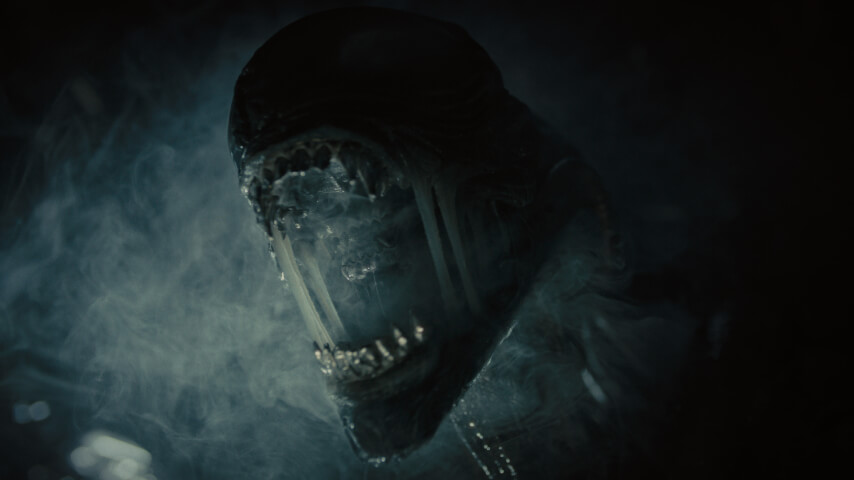It takes a lot of guts to set a new Alien film smack dab between its two best entries, Ridley Scott’s genre-defining 1979 original and Aliens, James Cameron’s equally-acclaimed 1986 sequel. But guts galore are exactly what director Fede Álvarez (quite literally) brings to the table in Alien: Romulus, the seventh installment in a now 45-year-old franchise. Implementing the best tools on display in the first films (such as robust practical effects, hand-crafted set design, and snippets from the original films’ scores) while also showing off Álvarez’s ability to bring tensions to a roiling boil, there’s plenty of on-screen allure and action to captivate audiences—that is, until they’re confronted with something so horrifying there’s nothing to do but look away. Yet for all of its visual flourishes and admittedly gnarly scares, Alien: Romulus never meaningfully engages with its central moral conundrum: Can a capitalistic worldview ever truly value human life?
Rain (Cailee Spaeny) and her “synthetic” brother Andy (a spectacular David Jonsson) have only ever known life on the dank, sunless colony dubbed Jackson’s Star. Their parents passed away years ago—not many live to old age here, as the main means of employment are disease-inducing mining jobs—and the siblings have since been relegated to indentured servitude. Unwilling to waste the rest of their lives working for the soulless Weyland-Yutani corporation, the two reconnect with old friends who just so happen to be plotting their immediate escape.
The ragtag team consists of Rain’s ex-paramour Tyler (Archie Renaux), his sister Kay (Isabela Merced), their prickly cousin Bjorn (Spike Fearn), and amateur pilot Navarro (Aileen Wu). According to them, a decommissioned W-Y spaceship hovers just above their location; if they manage to board it, they can harvest cryogenic pods and enough fuel to make the seven-year journey to the nearest habitable planet, one that is verdant and bright. In fact, Andy is essential to their plot, since his W-Y programming would allow them seamless clearance onto the craft.
Suffice to say, the plan immediately begins to crumble as it unfolds. After taking off and weathering intense turbulence, the crew gets their first glance of the craft only to realize it’s not a ship at all, but rather a sprawling space station named Renaissance. When they finally board, they come to understand that there are two separate sections in the station—Remus and Romulus, also alluding to incoming sibling strife—which at first doesn’t pose much of a problem. They find the cryogenic tanks and fuel quickly enough, but these discoveries also yield hordes of hungry facehuggers.
The callbacks and references employed by Álvarez are too numerous to list and range from name drops to Easter eggs. But dedicated fans of the franchise, no matter their definitive ranking, will be pleasantly surprised (or perhaps put-off) by the director’s determination to flex his knowledge. A skilled resuscitator of IP thought long dead (namely with his fantastic 2013 Evil Dead remake), Álvarez knows the value in signaling to fans that he did his homework. But there’s one particular gimmick that just feels plain tasteless, where a now-deceased actor is crudely reanimated via “facial and vocal reference,” no doubt aided by AI technology. (Didn’t SAG-AFTRA strikers warn of this very possibility, whether the actor is living or not?) Even if the re-inclusion of this character advances the plot—particularly for Andy, who reckons with whether he should be hard-wired to consider “what’s best for the company” over “what’s best for Rain”—it’s shocking that there is no self-awareness over how far Hollywood will go to chase a profit, even if it’s over someone’s dead body. Weyland-Yutani isn’t the only evil corporation afoot.
The best parts of Alien: Romulus are when Álvarez and his frequent co-writer Rodo Sayagues elevate their references as opposed to simply incorporating them. While Alien’s original imagery was born from H.R. Giger’s yonic and phallic designs, the sheer amount of original vagina-influenced horror manages to be evocative rather than merely shocking. Since these elements are easily the most jolting and enjoyable of the film, I’ll leave their finer details under wraps. But trust that all of the gore makes an otherwise shameless IP money-grab into something inventively grotesque. Equally elevating the film are Spaeny and Jonsson, whose characters are far more fleshed-out than their co-stars, who mostly exist to appetize lurking xenomorphs. Mid-watch, my main gripe with Álvarez’s approach, in terms of pure horror, was that the aliens aren’t given enough spotlight; as the film careens toward its climax, however, a monster emerges that made me immediately retract my previous thought. Again, any hint of a spoiler would be a disservice here, so just take my word for it.
What’s so frustrating about Alien: Romulus is that it never manages to really say anything. There are no insights into capitalistic evils, what constitutes a “real” person, or even the brutality inherent to birthing new life. While incredible practical gore effects and stunning set pieces make Álvarez’s installment well worth watching, it’s as void of meaning as space itself. There are no answers, not even questions, merely what we manage to project onto vast emptiness.
Director: Fede Álvarez
Writer: Fede Álvarez, Rodo Sayagues
Starring: Cailee Spaeny, David Jonsson, Archie Renaux, Isabela Merced, Spike Fearn, Aileen Wu
Release Date: August 16, 2024

 Keep scrolling for more great stories.
Keep scrolling for more great stories.
